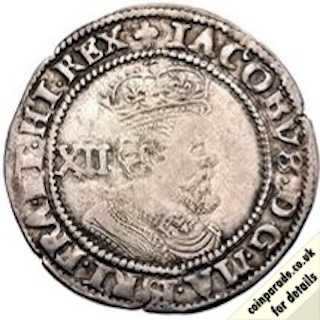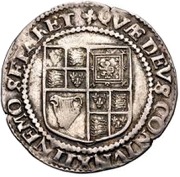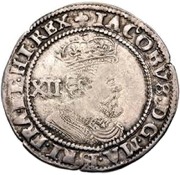
 The 1623 Shilling - James I
The 1623 Shilling - James IThis silver coin would have been struck between 1623 and 1624. Third coinage. Tower (London) mint.
Diameter 32mm. Weight 5.86g.
The Reverse show a Coat of Arms.
 The Obverse shows the Crowned sixth bust of King James I.
The Obverse shows the Crowned sixth bust of King James I.The XII to the left of the head is a mark of value (12 pence).
Images used by permission of CNG.
Mintage: Not known
Minted at The Royal Mint
More information (monarch, year, mint, country, category) can be found below coin listings.
Below are some coins currently being offered on eBay. As an eBay Partner, We may be compensated if you make a purchase.
List items on:
List items on:
Remember 1623 ?
Monarch is King James I. 1623 can be written MDCXXIII. The King's favourite (some say his lover) George Villiers is made Duke of Buckingham.
James I (1603-1625)
 James was born on 19 June 1566 at Edinburgh Castle, the son of Mary, Queen of Scots, and Henry Stuart (Lord Darnley) in the House of Stuart. He was James VI of Scotland and James I of England but combined the thrones from his Coronation on 24 March 1603.
James was born on 19 June 1566 at Edinburgh Castle, the son of Mary, Queen of Scots, and Henry Stuart (Lord Darnley) in the House of Stuart. He was James VI of Scotland and James I of England but combined the thrones from his Coronation on 24 March 1603.Despite a few problems (such as the Gunpowder Plot in 1605), James left a legacy of a fairly peaceful, low taxation reign. He died from natural causes on 27 March 1625, aged 58. James was Father of Charles I.
On coins, James I is usually written as Latin: IACOBVS I.
Category: Shillings
The Shilling (written 1/-) is one-twentienth of a pound, worth 12 old pence (5 new pence). It is traditionally a silver coin, but since 1947 it has been made from cupro-nickel. Shillings are known as 'Bobs'.Shillings are old coins and the English shilling has been around since about 1549, although there were 12 pence coins before that called Testoons from about 1489. The British shillings was the continuation from 1707.
After decimalisation on 15 February 1971, the coin was replaced by the five new pence piece. Originally, the 5p coin was the same size as the shilling but was later made much smaller.
Which Mint: The Royal Mint
The Royal Mint is the designated place for the UK to mint coins. It dates back well over 1000 years and is a Government-owned company. Formed in the reign of Alfred the Great about the year 886, during the period 1279-1812 it was generally referred to as The Tower Mint as it was housed at the Tower of London. The Master of The Royal Mint has included famous figures such as Sir Isaac Newton.
Since 2010 it has operated as Royal Mint Ltd, a company owned by HM Treasury, under an exclusive contract to supply all coinage for the UK although it also produces medals and coins for other countries. It is currently located at Llantrisant, Wales.
Country of Origin: United Kingdom
The United Kingdom (UK) is the Union of England, Scotland, Wales and Northern Ireland. It is often refered to as Great Britain (GBR). It has a long, rich history. The orignal coinage was Pounds, Shillings and Pence but since decimalisation on 15 February 1971, it is £1 = 100p, that is One Pound = 100 pence. The coinage of the UK is also a long history, the Royal Mint being established as long ago as 886AD when coins were hammered. Today there is perhaps 30 billion coins in circulation, and many (numismatic) collectors coins and sets are issued frequently in gold, silver and other metals.








